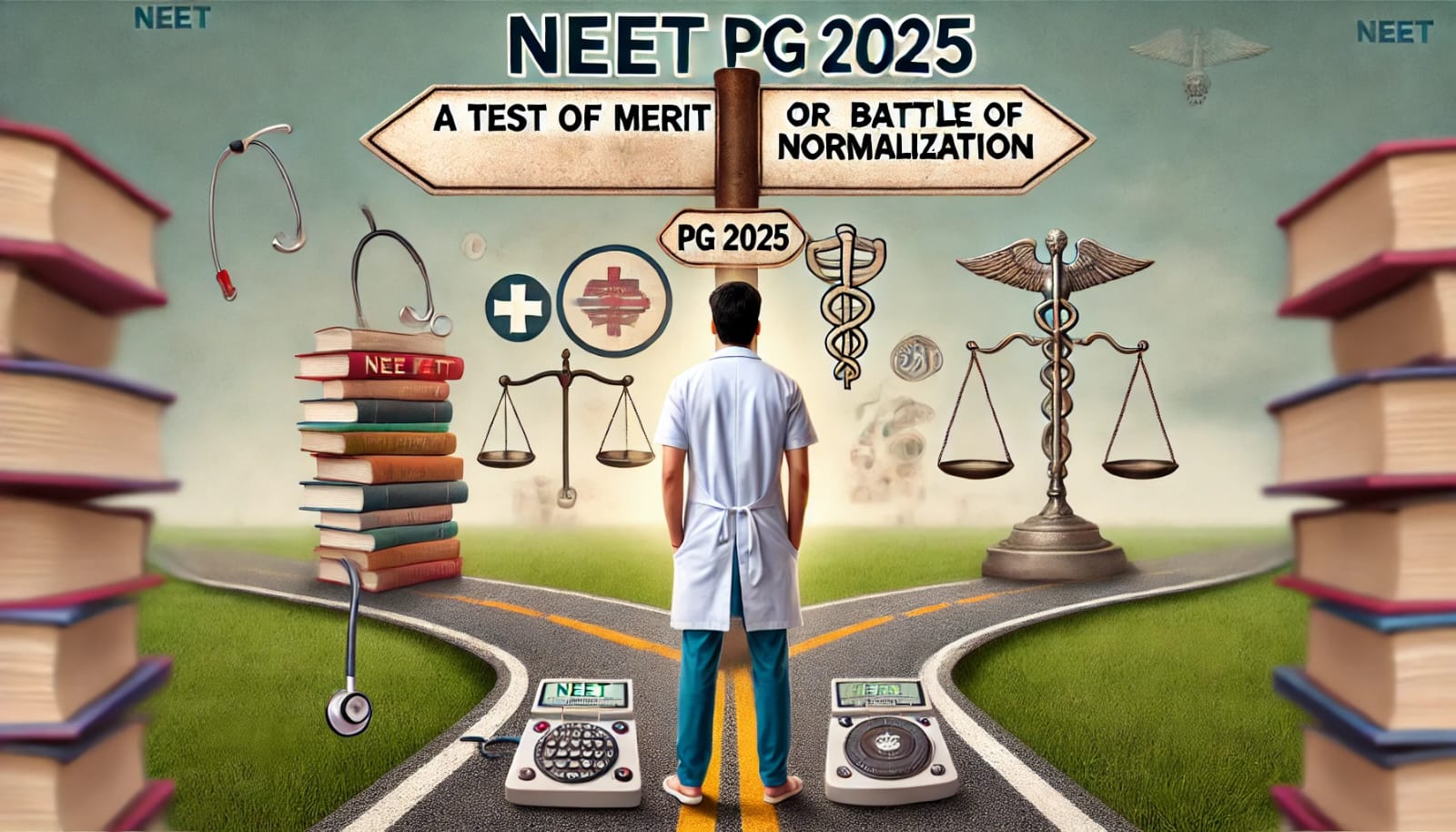NEET PG 2025: A Test of Merit or a Battle of Normalization?
Medical students are not asking for special treatment; they are demanding transparency and fairness, two principles that should be fundamental to any national-level examination.

The National Eligibility cum Entrance Test for Postgraduate (NEET PG) 2025 is set to take place on June 15, but instead of excitement, a wave of anxiety has gripped medical aspirants. The reason? Once again, the National Board of Examinations in Medical Sciences (NBEMS) has decided to conduct the exam in two shifts, a move that has sparked debates over fairness, transparency, and the very integrity of the ranking process.
With only three months left for the exam, the medical community is questioning whether this decision ensures a level playing field or places some candidates at an unfair disadvantage. The primary concern remains the normalization process, which, despite being implemented last year, continues to lack clarity and has raised serious concerns among students, doctors, and medical associations.
Last year, NEET PG shifted from a single-exam format to a two-shift system, dividing candidates into two different sessions. The decision was made to accommodate logistical challenges and reduce exam center overcrowding. However, this shift introduced a significant challenge of variation in question paper difficulty levels across shifts.
The problem with multiple shifts is simple: if one batch of students gets a harder set of questions than the other, their raw scores could be significantly impacted. The only way to “balance” this discrepancy is through score normalization, a statistical process meant to adjust scores so that they are fair across different shifts. But the effectiveness and transparency of this process remain questionable.
Many aspirants believe that score normalization is not a foolproof system. Unlike standardized exams like USMLE or PLAB, where question banks are uniform and extensively validated, NEET PG’s approach to normalization lacks clarity. Several students last year filed petitions demanding that NBEMS disclose:
The exact normalization formulaRaw and pre-normalized scoresAnswer keys and response sheets
However, these requests were largely ignored, leading to distrust in the system.
Leading voices in the medical community, including doctors and organizations like the Federation of All India Medical Associations (FAIMA), have opposed the two-shift system.
Dr. Shubham Anand, a resident doctor at AIIMS Deoghar and chairman of the Global Association of Indian Medical Students, has urged NBEMS to reconsider the two-shift model.
“With three months still left for NEET PG 2025, there is sufficient time to improve exam security and expand exam centers, making it possible to conduct the test in a single shift. A uniform exam ensures that every candidate faces the same level of difficulty, eliminating the need for a controversial normalization process.”
The Indian Medical Association (IMA) has echoed similar concerns, arguing that merit should not be left to a mathematical formula that students have no control over.
Dr. Rohan Krishnan, founder of FAIMA, has also criticized this approach, stating:
“We have two lakh aspirants appearing for NEET PG. If NEET UG, with over 20 lakh candidates, can be held in a single shift, why is it difficult for NEET PG? Conducting exams in multiple shifts leads to unnecessary debates, court cases, and stress for students. A single shift is the simplest way to ensure fairness.”
This concern is further amplified by past experiences where even a one-mark difference could drastically alter ranks, affecting students chances of securing a preferred specialty or institute.
The controversy surrounding the NEET PG 2024 normalization process remains fresh in students minds. Many candidates claimed that:
The formula was never disclosedThe difficulty levels varied significantly between shiftsThe final merit list was questionable
Some students even approached the courts demanding a re-evaluation of scores and a halt in the counseling process until transparency was ensured. However, their demands were not met, leaving many feeling cheated by the system.
Medical students are not asking for special treatment; they are demanding transparency and fairness, two principles that should be fundamental to any national-level examination.
NBEMS Must Address the Following Key Issues
1. Release the Normalization Formula in Advance: Candidates should not be left guessing how their scores will be adjusted. A detailed methodology of the normalization process should be included in the official information bulletin.
2. Publish Raw Scores, Pre-Normalized Scores & Answer Keys: In exams like USMLE, candidates receive detailed performance reports, including question-wise analysis. If NBEMS wants to build trust, it must introduce similar transparency.
3. Consider Reverting to a Single-Shift Exam: While logistical challenges exist, expanding exam centers and increasing security measures can solve these issues. NEET PG is already a computer-based test (CBT), making it more manageable than a traditional pen-and-paper exam.
4. Establish a Redressal Mechanism for Discrepancies: A structured system should be in place where students can formally challenge their results if they find discrepancies in the normalization process.
With just three months left, medical aspirants across the country are waiting for clarity. The NBEMS must address these concerns before releasing the information bulletin, not after students start raising objections.
If normalization is truly fair, why is it kept hidden?If a single shift is possible for NEET UG, why is it not possible for NEET PG?If transparency is a priority, why are answer keys and raw scores not made public?
These are not baseless questions. These are legitimate concerns of future doctors, whose careers depend on this examination.
The final decision lies with NBEMS will it choose fairness or continue with a flawed system?As the debate continues, one thing remains clear: in a profession built on precision and trust, the entrance process should uphold the same standards.
Source: indianexpress.com
 Sunny Parayan
Sunny Parayan
#NEET #NEET2025 #medicalaspirants #IMA #normalization #fairexam #healthvoice
